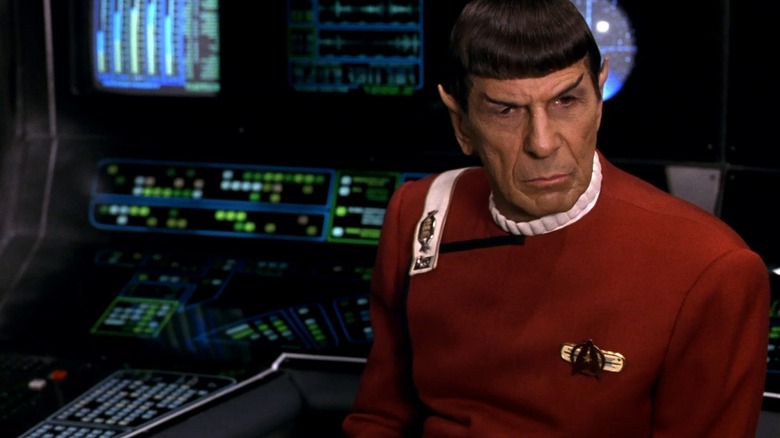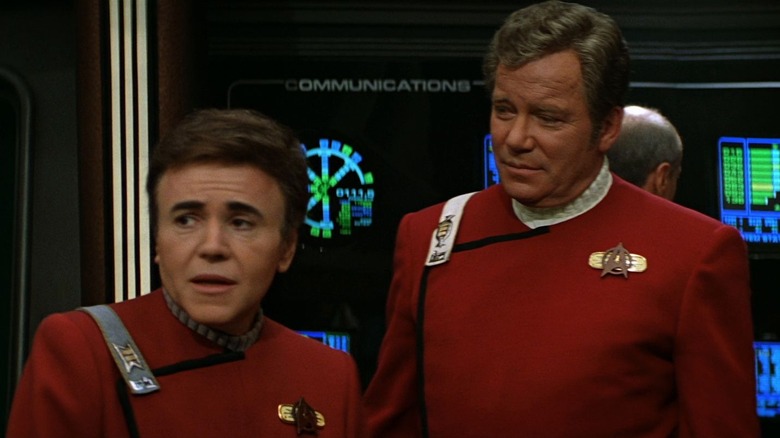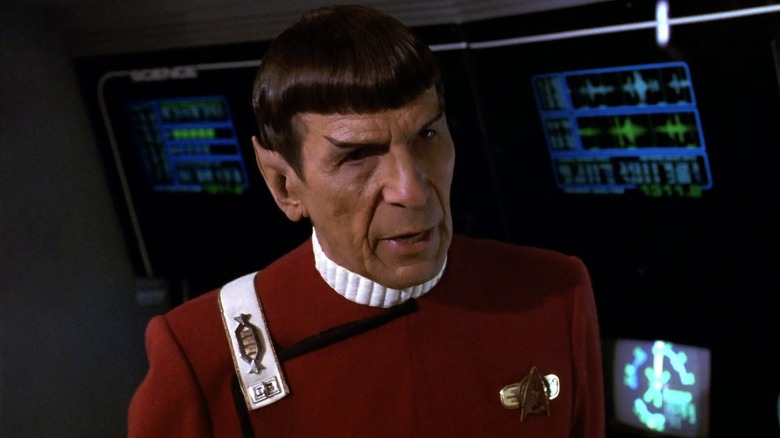Why Leonard Nimoy Passed On Star Trek Generations
At the end of Nicholas Meyer's 1991 film "Star Trek VI: The Undiscovered Country," the U.S.S. Enterprise-A is ordered back to Starfleet headquarters ... to be decommissioned. This was, the crew finally realized, their final, final adventure as a crew, and the road had come to an end. Spock (Leonard Nimoy), however, gave the perfect response "If I were human," he said, "I believe my response would be: 'Go to Hell.'" He then added, hastily, "If I were human."
I can only hear Nimoy's reading of "Go to Hell" when thinking about his non-participation in "Star Trek: Generations" in 1994. "Generations," as most Trekkies might tell you, is a notably weak film, presenting a rushed jumble of ideas without much drama or profundity. The plot follows a free-floating space ribbon called the Nexus, which blows up starships but also sucks survivors essentially into Heaven, a parallel dimension of pure bliss where time has no meaning.
"Generations" begins in the year 2293 and opens with a sequence wherein Kirk (William Shatner), Chekov (Walter Koenig), and Scotty (James Doohan) oversee the maiden voyage of the U.S.S. Enterprise-B. During the test flight, the ship encounters the Nexus and Kirk is sucked inside, presumably killed. The film then fast-forwards 78 years to the era of "Star Trek: The Next Generation," where the action begins in earnest.
The original plan for the 2293 sequence was for the whole original "Star Trek" cast to be present. After they received the script though, most of the cast declined to appear because there wasn't enough for them to do. That was certainly Nimoy's thinking, which he shared in a 2007 interview with TrekMovie. When handed the script, he more or less told them to go to Hell.
Spock and his five lines of dialogue
Watching "Generations," one can likely sense that certain lines of dialogue were intended for different characters. Chekov, for instance, ends up curing people in sickbay, clearly an action that should have been taken by Dr. McCoy. The whole purpose of the 2293 sequence was to seemingly kill off Kirk and insert him into the Nexus, and the rest of the cast had nothing to contribute to that. As such, most of them turned down the gig.
Nimoy noted that there was no Spock role in the script, saying that his entire job would be dryly reciting a few lines of dialogue. It seemed so useless and tacky, especially after "Star Trek VI: The Undiscovered Country." Nimoy felt it was a little disrespectful to offer him a "Star Trek" job and not treat his character with respect. The job was offered by "Star Trek" executive producer Rick Berman and Nimoy was blunt right to his face. As he recalled:
"There was not a Spock role. There were five or six lines attributed to Spock in a scene with Chekov and Uhura and Kirk and whoever else was there, but it had nothing to do with Spock. They were not Spock-like in any way. I said to Rick Berman, 'You could distribute these lines to any one of the other characters and it wouldn't make any difference.' And that is exactly what he did. There was no Spock function in the script."
Koenig and Doohan, it seems, didn't much mind that they had small roles in "Generations," although Koenig did find, in retrospect, that he could have done a lot more. He even wrote and shot a scene for himself, showing how Chekov felt about the "death" of Kirk ... and it was cut.
Nimoy said 'Thanks, but I'll pass.'
Nimoy, recall, hadn't just played Spock for 25 years at that point, but had also directed two successful and respected "Star Trek" feature films with "Star Trek III: The Search for Spock" and "Star Trek IV: The Voyage Home." He also contributed to the script of "Star Trek VI" on top of playing a major role in it. Outside of "Trek," Nimoy had helmed "Three Men and a Baby," the fifth highest-grossing film of 1987, and comedies like "Funny About Love" and "Holy Matrimony."
To be asked to play tenth-fiddle to Shatner and to the entire "Next Generation" cast felt like an insult. Nimoy continued:
"I have always tried to make a contribution to these movies. There was no contribution to be made in that movie. It was just sort of 'Lets get Nimoy in here too.' I said there is nothing here I can do so I said 'Thanks, but I'll pass.'"
Nimoy returned to the role of Spock in 2009 for the cinematic reboot of "Star Trek" directed by J.J. Abrams, as well as its follow-up, "Star Trek Into Darkness," in 2013. In those films, he was the only returning cast member from the original "Star Trek" TV series and had several conversations with his younger, parallel self, played by Zachary Quinto. His character either actively participated in the plot or provided unique insight into a visiting villain. The focus on Spock was likely very appealing to Nimoy and was certainly a much better offer than what Berman had asked him to do for "Generations" 15 years earlier.
"Into Darkness" was Nimoy's final film role before his death in 2015.


